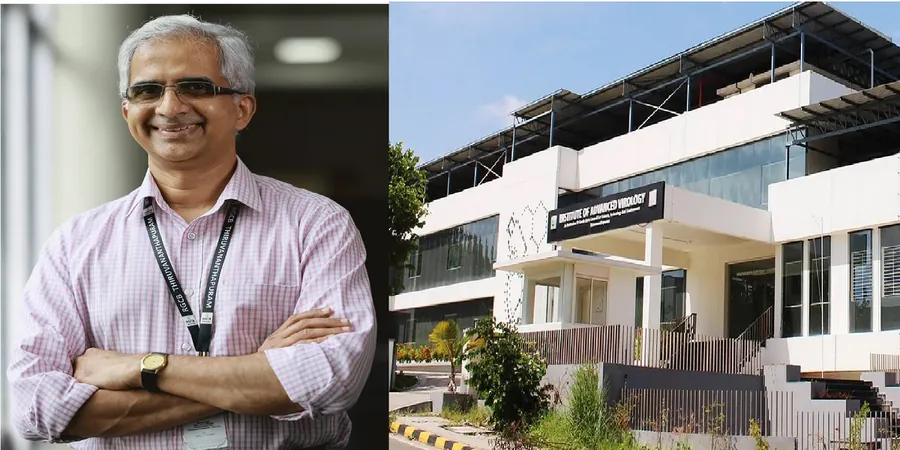
Unraveling the Viral Maze: Insights from Dr. E. Sreekumar on the Challenges of Vaccine Development
2025-05-24
Author: Arjun
Frequent Mutations Challenge Vaccine Reliability
In a compelling chat with South First, Dr. E. Sreekumar, Director of the Institute of Advanced Virology in Kerala, revealed that the unpredictable nature of viruses like influenza makes it tough to depend on a single vaccine. Each year, new flu variants emerge, necessitating fresh vaccinations to protect against evolving strains.
Kerala: A Virological Vanguard
Dr. Sreekumar emphasizes Kerala's critical role in global virology research. Despite initial challenges, the Institute of Advanced Virology has blossomed into a vital regional hub, now capable of testing over 85 pathogens and playing a key role in outbreak responses across Southern India.
A Vision of Excellence in Virology
The pivotal change came two years ago when Kerala's Chief Minister Pinarayi Vijayan vowed to transform the Institute into a world-class facility, catalyzed by the state's history of confronting viral outbreaks like Chikungunya and Nipah.
A Path Paved with Challenges and Growth
Although the project encountered delays due to the pandemic, momentum surged in late 2020 with Dr. Akhil Banerjee's arrival, followed by Dr. Sreekumar's directorship in 2021. Since then, under his leadership, staffing has grown to over 70, alongside the establishment of cutting-edge research labs and diagnostic facilities.
Key Factors in Kerala’s Viral Outbreak Detection
When asked why Kerala frequently reports viral cases during global outbreaks, Dr. Sreekumar highlighted the state's robust global diaspora and tourism. The state's location near the biodiversity-rich Western Ghats increases exposure to zoonotic viruses, while the tropical climate fosters conditions conducive to disease vectors.
Why Depend on National Bodies?
Despite having advanced local facilities, Kerala still relies on the Pune-based National Institute of Virology during significant outbreaks, a practice rooted in protocol established during the Nipah outbreak in 2018. Samples are often sent to ensure standardized response measures.
Navigating Challenges of Outbreak Management
Dr. Sreekumar viewed the initial COVID-19 outbreak as a challenging phase, but the institute has since made impressive strides, expanding testing capabilities for over 85 viruses from just 20.
Healthcare Excellence Amidst Crisis
Dr. Sreekumar defends Kerala’s healthcare system against critics who claim ineffective outbreak prevention. He asserts that the state excels in early detection and response, citing minimal discrepancies between reported cases and fatalities during the COVID-19 pandemic.
Cholera: A Wake-Up Call
The recent resurgence of cholera after decades prompts concerns about local disease prevention. Dr. Sreekumar acknowledges that while significant progress has been made, areas prone to waterlogging remain vulnerable, though swift detection and response efforts are in place.
The Mutation Challenge in Vaccine Development
The ongoing mutation patterns of viruses, particularly COVID-19 and influenza, complicate vaccine development. Dr. Sreekumar notes that while flu vaccines need annual updates due to rapid mutations, vaccines for other viruses, like measles, maintain effectiveness over extended periods.
A Pioneering Moment in Public Health
Reflecting on his career, Dr. Sreekumar recalls a defining moment during the chikungunya outbreak when he helped establish in-state testing protocols, transforming Kerala's health response capabilities for various viral diseases.

 Brasil (PT)
Brasil (PT)
 Canada (EN)
Canada (EN)
 Chile (ES)
Chile (ES)
 Česko (CS)
Česko (CS)
 대한민국 (KO)
대한민국 (KO)
 España (ES)
España (ES)
 France (FR)
France (FR)
 Hong Kong (EN)
Hong Kong (EN)
 Italia (IT)
Italia (IT)
 日本 (JA)
日本 (JA)
 Magyarország (HU)
Magyarország (HU)
 Norge (NO)
Norge (NO)
 Polska (PL)
Polska (PL)
 Schweiz (DE)
Schweiz (DE)
 Singapore (EN)
Singapore (EN)
 Sverige (SV)
Sverige (SV)
 Suomi (FI)
Suomi (FI)
 Türkiye (TR)
Türkiye (TR)
 الإمارات العربية المتحدة (AR)
الإمارات العربية المتحدة (AR)